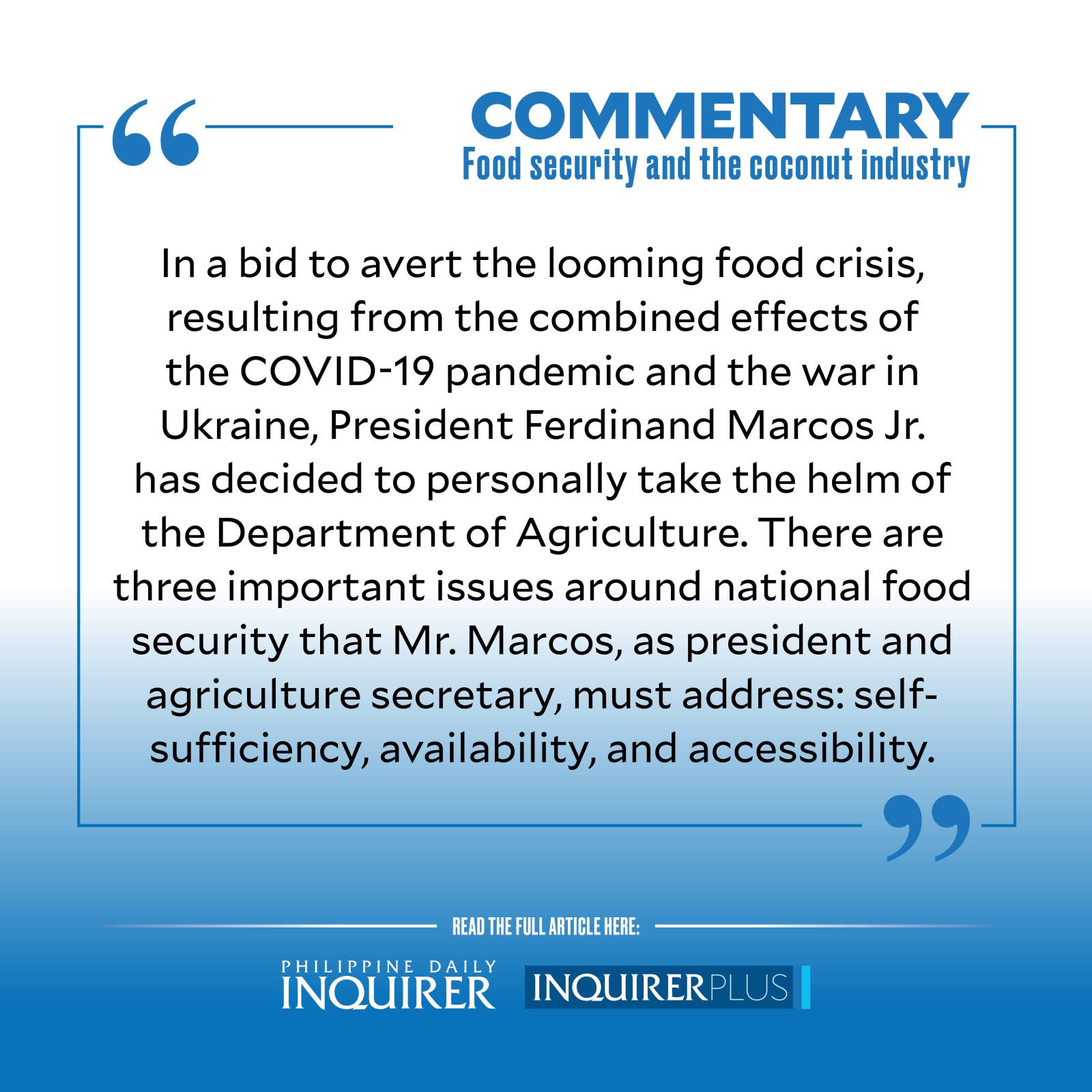
In a bid to avert the looming food crisis resulting from the combined effects of the COVID-19 pandemic and the war in Ukraine, President Ferdinand Marcos Jr. has decided to personally take the helm of the Department of Agriculture (DA).
There are three critical issues around national food security that Mr. Marcos, as president and agriculture secretary, must address: self-sufficiency, availability, and accessibility.
Self-sufficiency means a country can produce enough food and is not dependent on external sources to provide for the basic requirement of its population. Natural disasters, pests, wars, climate change, unavailability of essential inputs like fertilizers, and a host of other production issues as well as rapid population growth and scarcity of agricultural land, not to mention neglect and wrong policy, can impair a country’s capability to feed its people.
Importation is a way by which countries that cannot produce enough food ensure the availability of food supplies for their population. Singapore, for example, which has only 1 percent of its land available for food production, imports 90 percent of its food requirement. The Philippines, despite half of its population being directly or indirectly dependent on agriculture for their livelihood, resorts to the importation of rice, fish, and other basic food items due to production shortages. Availability is better secured through local production and better distribution channels.
Access means the ability of individuals to withdraw their shares from food stores. It is about endowments and entitlements. Endowments are an individual’s assets such as labor, land, money, etc., which can be exchanged for entitlements to food. Affordability and purchasing power are important aspects of food accessibility.
The coconut industry and food security. The Philippine coconut industry can contribute meaningfully to national food security through food production and income improvement strategies.
There are 3.5 million hectares of coconut lands in the country. Much of this area can be devoted to food production to enhance the country’s food self-sufficiency. Easily, 70 percent of the country’s coconut farms are suitable for intercropping. This means that an additional 1.8 million hectares of land is available for crop, poultry, and livestock production. Various crops such as vegetables, bananas, and root crops can be grown under coconut trees to augment the country’s food supplies. Coconut farmers can raise poultry and livestock, grow cacao, coffee, pineapple, and other high value crops to boost their incomes.
Intercropping not only improves food production but increases incomes as well. Better incomes promote food security by improving access to food supplies.
Productivity improvement and value adding are also income-enhancing strategies available to coconut farmers. Introducing fertilizer into coconut farms will improve productivity, thereby doubling the incomes of 20 million Filipinos who are dependent on coconut farming for their living. This will enhance food security for close to 20 percent of the country’s population. In addition, coconut hybridization will further augment productivity in the long term.
Vertical and horizontal integration of the coconut industry will shield our coconut farmers from price shocks induced by a volatile global vegetable oils market. Manufactured finished products command better prices than semiprocessed raw materials. A vertically integrated industry with horizontally integrated plants that turn out products like oleochemicals, personal care products, virgin coconut oil, desiccated coconut, coconut flour, coconut milk, coconut water, and coconut milk-based beverages will increase domestic utilization of coconuts, thus promoting better and more stable coconut farmgate prices. Value adding will result in improved profitability and income for farmers.
The above measures are within reach of the Marcos Jr. administration. All that is needed is an inspired new vision for the coconut industry and proper utilization of resources under the new coconut levy law.
The vision of a vertically integrated coconut industry is not new to Mr. Marcos. During the first term of his father, Ferdinand Marcos Sr., the first serious attempt at an integrated industrialization plan for the coconut industry was made in 1968 with the formation of the interagency group on coconut industrialization. This was followed in 1971 by the passage of Republic Act No. 6260 also known as the Coconut Investment Act. From 1973 onward, a series of presidential decrees created the coconut levy and established measures to promote vertical integration. However, the plan failed when its implementors lost sight of the original vision.
The new Marcos administration can turn the promise of vertical and horizontal integration—multicropped hybrid coconut farms linked to farmer-run integrated processing and multiproduct downstream manufacturing plants—into reality and fulfill the dream of food security not only for coconut farmers but for all Filipinos.
——————
Romulo J. de la Rosa was administrator of the Philippine Coconut Authority from 2017 to 2019. He was appointed member of the Presidential Coconut Levy Trust Fund Committee in 1998.

